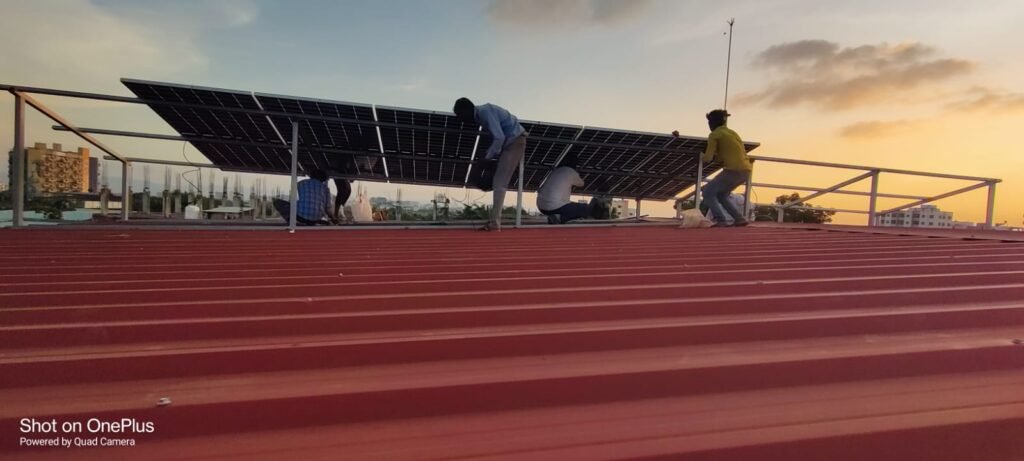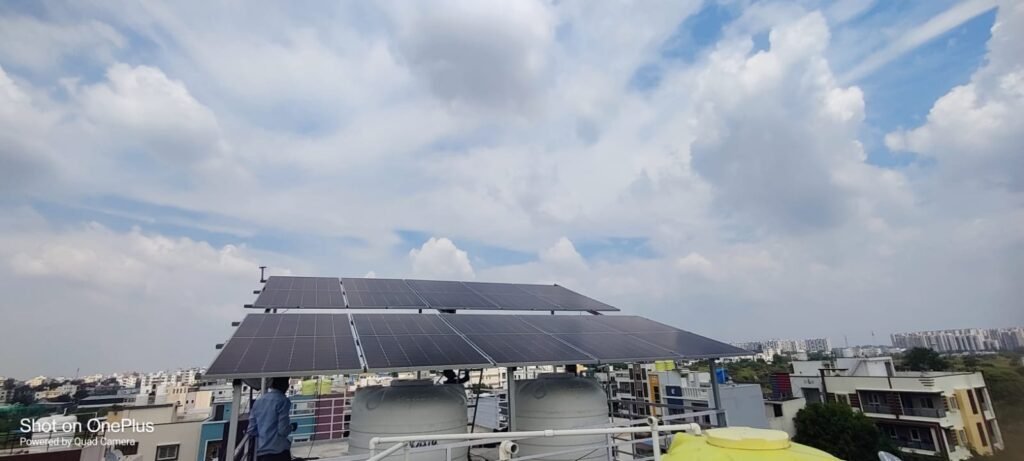

One of the most common misconceptions about solar power is that solar panels require constant sunlight to function efficiently. While it’s true that solar panels perform best under full sunlight, they can still generate power on cloudy days. In this blog, we will explore how solar panels perform in overcast conditions and answer common questions related to their efficiency during cloudy weather. For more information on solar solutions, visit Shree Ganesha Solar, a leading provider of solar power systems for homes and businesses.
Solar Panels Don’t Require Direct Sunlight to Work
- Solar panels work by capturing sunlight and converting it into electricity through photovoltaic cells.
- Even on cloudy days, sunlight still reaches the Earth, albeit in reduced intensity.
- While cloudy days reduce the amount of direct sunlight, the panels can still produce energy by absorbing diffuse sunlight, which scatters through the clouds.
- This means that solar panels continue to generate electricity, though at a lower output than on clear, sunny days.
Impact of Cloud Coverage on Solar Panel Efficiency
- Solar panels are less efficient on cloudy days, but they don’t stop working entirely.
- The degree of efficiency depends on how thick the cloud cover is. Thin clouds might reduce solar output by just 10-20%, while thick clouds can cut efficiency by as much as 50%.
- However, solar systems with high-quality panels and advanced technologies, such as those offered by Shree Ganesha Solar, are designed to maximize performance in various conditions, including cloudy weather.
Performance in Diffuse Light
- Even on overcast days, solar panels can capture diffuse light, which is sunlight scattered in all directions by the atmosphere.
- This type of light is weaker than direct sunlight but still provides a useful source of energy.
- Some solar panel technologies, like bifacial or high-efficiency monocrystalline panels, perform better in low-light conditions, making them ideal for areas that experience frequent cloud cover.
- By choosing the right type of panel, such as those available at Shree Ganesha Solar, you can ensure consistent energy production even when the skies are overcast.
The Role of Solar Inverters
- Solar inverters play a crucial role in optimizing solar panel performance.
- Modern inverters can adjust to varying light conditions and convert the energy produced by the panels into usable electricity efficiently, even in low-light environments.
- With the integration of advanced inverters, solar energy systems can adapt to cloudy weather conditions and continue producing electricity at optimal levels.
- Choosing a solar system with a quality inverter, like those offered by Shree Ganesha Solar, can significantly enhance performance during cloudy days.
Energy Storage Systems Keep You Powered
- One of the advantages of solar power systems is the ability to store excess energy for later use, typically using batteries or other energy storage solutions.
- On sunny days, solar panels often generate more electricity than you immediately need. This surplus energy is stored in batteries or fed back into the grid for later use.
- On cloudy days, your stored energy can be drawn upon, ensuring that you have a continuous power supply even when the panels aren’t producing at full capacity.
- Shree Ganesha Solar provides customized energy storage solutions, helping homeowners maximize the benefits of their solar power systems.
The Importance of Location and Climate
- The performance of solar panels on cloudy days can also depend on the geographical location of your home.
- In regions where cloud cover is frequent but still has enough diffuse sunlight, solar panels can perform reasonably well even during the rainy season.
- Additionally, the overall climate plays a role—areas with frequent but light cloud coverage (like coastal regions) often experience less of a drop in solar output compared to places with heavy, persistent cloud cover.
- By consulting with solar experts from Shree Ganesha Solar, you can get a tailored solution that takes your local weather conditions into account.
Long-Term Performance and Energy Production
- Despite the occasional cloudy days, solar panels are designed to provide reliable, long-term energy production.
- On an annual basis, most locations will still experience enough sunny days to make solar power a viable and cost-effective energy solution.
- Even in regions with frequent cloud cover, solar panels can produce significant savings on energy bills over time, especially when combined with smart energy management systems.
- Partnering with a reputable solar provider like Shree Ganesha Solar ensures that your solar system is optimized to perform well year-round, regardless of the weather.
Conclusion
While solar panels do experience reduced efficiency on cloudy days, they still perform and continue to produce electricity. Advances in solar panel technology and the use of high-quality components, like those from Shree Ganesha Solar, ensure that your system remains effective even in overcast conditions. Additionally, energy storage systems can provide backup power when sunlight is scarce.
Choosing the right solar solution for your home and location will allow you to harness the benefits of solar energy year-round, maximizing your savings and minimizing your environmental impact.
Explore your solar options today and ensure your home is ready to benefit from renewable energy, no matter the weather!

